India is one of the countries providing an affordable healthcare system. The low cost of healthcare services and high quality of private hospitals makes it a popular destination for medical tourists as well.
Despite low costs of healthcare services, treatment is inaccessible and unaffordable for a majority of Indians. Sixty per cent of primary health centres (PHCs) in India have only one doctor while about five per cent have none, according to the Economic Survey 2018-19.
Healthcare is an area that can be significantly impacted by artificial intelligence (AI). Although AI is prevalent the most in the fitness industry in the form of wearables in India, the technology can be quite useful to predict the outbreak of diseases and viruses. It has potential to improve risk prognosis, improve patient journeys and create further efficiencies. In India, AI has the potential to play a major role in making healthcare more accessible and making early diagnosis systems available. By delivering efficiencies and reducing cost, AI can play a major role in increasing accessibility of crucial medical care. In a vast country like India, AI provides opportunity for efficient disease tracking and management, particularly for fast spreading diseases.
The team at Deakin University, Australia has set up Applied Artificial Intelligence Institute (A2I2) which began operations as an Institute in January 2019. The Institute was formed by merging two groups already established at the University; PRaDA (Pattern Recognition and Data Analytics) and DSTIL (Deakin Software and Technology Innovation Laboratory). Under the leadership of Alfred Deakin Professor Svetha Venkatesh, PRaDA has been recognised internationally for its groundbreaking work in machine learning and pattern recognition in sectors as diverse as surveillance, social media and includes healthcare.
One vertical in the Indian healthcare sector where AI can play a huge role is tele-medicine, which is remote diagnosis and treatment of patients through telecommunication and information technology. Tele-medicine is an effective solution to bridge the urban-rural divide and reach the remotest parts of the country through high-speed internet connectivity. As of 2016, the tele-medicine market stood at USD 15 million and is expected to rise at a CAGR of 20% during FY 2016-20 to reach USD 32 million by 2020.
India will see internet users rise by about 40 per cent and number of smartphones to double by 2023. With the increased penetration of smartphones, specialized diagnostic solutions can be provided through mobile phones for the convenience of doctors and patients. AI,is not going to replace doctors but will be an ideal middle layer to bridge the demand and supply gap between patients and doctors.
The diversity and potential scale of the Indian healthcare system affords an opportunity and incentives like no other to pilot and operationalize innovations. Healthcare provides opportunities for AI innovations rather than merely providing a field where existing AI technology can be applied. India has been ranked third in Asia Pacific in terms of AI readiness and can leapfrog in case of AI as the healthcare system in India is open to innovation.

 AI, is not going to replace doctors but will be an ideal middle layer to bridge the demand and supply gap between patients and doctors.
AI, is not going to replace doctors but will be an ideal middle layer to bridge the demand and supply gap between patients and doctors.


































